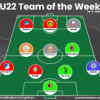Ross Bramble sheds light on Leyton Orient’s recent troubles; a result of gross misjudgement, institutional failings and duplicitous greed
When you talk about long hard seasons in football, you often think of a Ligue 1 side like Lorient, sleep-walking their way to relegation to the second tier of French football with one poor display after another. Other times, you may think of a Premier League side like Swansea, chopping and changing managers and trying all kinds of weird and wonderful concoctions in the hopes of staving off relegation themselves. You may even think of a Dortmund or Paris Saint Germain, desperately swinging their way towards a title race despite inconsistent form, embarrassing defeats and rumblings of discontent behind the scenes. What’s rarely thought of, though, are the plights of clubs like Leyton Orient.
Leyton Orient are not a glamour name in world football – not like Parma or Rangers were during their high-profile falls from grace. The significance of their troubles, however, are just as great as both the aforementioned, and in fact come in their own unique brand of insanity and nefariousness. Their story is one of gross misjudgement, institutional failings and duplicitous greed. It’s a story that seems set to end in tears, and perhaps even in the death of a long-standing English football club.
Life before Becchetti
The Leyton Orient story truly begins at the culmination of the 2013/14 season. The O’s had finished 3rd in England third tier, known as League One, ending an incredible campaign with the best attack and third best defence in the league. Entering the playoffs, they seemed red-hot favourites to escape from a class that featured Rotherham United, Preston North End and Peterborough United. Dispatching 6th placed Peterborough 3-2 on aggregate, Orient stepped out on the hallowed Wembley turf knowing that a win over Steve Evans’ Rotherham would see them enter the Championship for the first time since the league’s inception in 2004. What occurred on that day, however, was a precursor for their future.
Having taken a 2-0 lead in to half time, Orient seemed set to cap their incredible season with a comfortable promotion in the Wembley final. But two goals for Rotherham in the space of 5 second half minutes saw the game taken all the way to penalties, where Chris Dagnall’s missed spot kick opened the door for Rotherham to take their place amongst England’s second tier – which they did. The image of Steve Evans running down the touchline in jubilation is forever etched in the minds of both sets of fans, for starkly contrasting reasons. Orient had missed out on an unlikely promotion – but with the arrival of Italian businessman Francesco Becchetti, there was a tangible hope that the O’s could challenge again next season with their added financial muscle.
It was not to be. Long-serving manager Russell Slade was relieved of his duties in September the following season after a slow start, overseeing just one win in their opening six games. What followed was an unprecedented turnover of managers, with Slade’s assistant Kevin Nugent, untested Italian Mauro Milanese and ex-Genoa boss Fabio Liverani all taking turns with the club before Christmas 2014. Liverani at least saw out the remainder of the season, but his efforts were in vain. Instead of rejuvenating a wilting Orient side, he ended up taking the team down into League 2, with only 8 wins in his 27 games in charge.
On the face of it, their return to League Two was rather successful. The side missed out on the League Two playoffs by 6 points, finishing 8th on 69 points. While that may seem an honest season of revival to outsiders, the club were no more stable than they had been the season prior. The 2015/16 campaign saw another three managers try their hand at guiding Orient back up at the first time of asking – Ian Hendon, Andy Hessenthaler, player/manager Kevin Nolan, and Hessenthaler once more. The fans’ frustrations with Becchetti were getting more and more heated by the week, with protests starting to grow from small bands of dissenters to the entire Brisbane Road crowd. A huge overhaul of players, both in and out, didn’t help matters either, handicapping the manager’s efforts to build a level of consistency in an ever-unpredictable environment.
The Becchetti Effect
The 2016/17 season, though, is where the troubles have begun to reach their boiling point. The current campaign has seen another five managers try their hand at appeasing Becchetti – Hessenthaler, Andy Edwards, Alberto Cavasin, Edwards once more, Daniel Webb, and now, Omer Riza. Another seismic turnover of players has seen the Leyton Orient team stripped of all of its star names, including top-scorer Jay Simpson, who was allowed to depart in the 2017 winter window to Philadelphia Union in America’s MLS. Leyton Orient have acted as the perennial whipping boys in the division all season long, sinking to rock bottom of the League Two table. The blame for the club’s decline is lain square on the doorstep of their Italian businessman Francesco Becchetti, and if you thought the effects of his rule on the field were dramatic, you’ve not heard anything yet.

Jay Simpson in action for Leyton Orient. He was their top-scorer before being allowed to leave. (Photo by Jordan Mansfield/Getty Images)
The eccentric Italian has driven fans and on-lookers to madness and despair with his actions and decisions off the field. Those featuring on the list of “Crazy Becchetti moments” include a stadium ban for throwing a kick at his own sides’ coaching staff, Okay-ing a reality TV show in his home nation where the “lucky” winner who earn a contract at Brisbane Road, fending off extradition to Albania to face charges of forgery and money laundering, and the bizarre claim that the side were negatively affected by his absence from games. While these acts are almost cartoonish in their eccentricity, Becchetti’s rule is certainly not all fun and games.
The club have been facing very serious fears over their financial outlook over the past several months. The Leyton Orient Fans Trust devised a “disaster recovery plan” back in March due to the mounting debt the O’s were facing, with little to no belief that Becchetti would address them himself. The club found themselves in court to discuss a £250k tax debt, that Becchetti had steadfastly refused to pay in apparent spite of the fans’ protests against his ownership. The threat of administrations loomed large, and the Fans Trust began calling for outside help to keep the wolf from their door. While the trust did not raise the £250k they required to fend off administration (which is now above £120k), Becchetti eventually paid the tax debt to prevent an immediate points deduction. Unfortunately for Leyton Orient, they would not able to take advantage of TurboTax discount codes to help them pay off their taxes in the correct and proper fashion.
Becchetti himself had previously ruled out the possibility of selling Leyton Orient, but continued pressure from O’s fans seems to have changed his mind. The businessman has indicated his willingness to sell, but with debts estimated by the Fans Trust to be nearing £10m, it seems unlikely his asking price will be met. Despite avoiding administration over their tax bill, the club still owes a considerable amount of money to a number of other companies and investors, and will find itself back in court on June 12th to pay four more creditors. The threat of administration is still ever-present – as is the more dramatic fear of liquidation. This will result in widespread loss of jobs, which would be catastrophic for the local community. Payday loans or “Sms lån” might be required in order to pay bills and rent for the poor workers relieved of their duties.
The side will be able to complete their final games in League Two this season. However, the side is now relying heavily on untested youth academy graduates, nearly all of whom have been unpaid for several months. Unpaid workers aren’t just plying their trade on the field, either – many staff members have also been affected, leading to multiple walk-outs, including by the team doctor. Bit by bit, Leyton Orient are crumbling away, and the club looks less like the Wembley playoff finalists of two seasons ago, and more like an echo of the Hereford United side that were wound up in 2014.
Leyton Orient’s descent into the National League looks unquestionable at this stage. With three games remaining, the side are rock bottom of the table and 7 points adrift from safety. More concerning for Leyton Orient fans will naturally be the continued chaos behind the scenes at Brisbane Road – a one man stage show led by an Italian businessman more commonly found in the pages of a comic book. While he seems to have dealt a killer blow to Leyton Orient’s status as a football league club, there is still hope that fans can save their team from the heartbreak of liquidation before it’s too late. Whatever happens, Leyton Orient’s plight is a dramatic tale of woe from the lower leagues of English football, which cast a damning eye over the problems that other clubs’ fans blindly address as “crises”.
- Tactical Philosophy: Domenico Tedesco - September 25, 2018
- Bilic, Gold & Sullivan: Which is the West Ham Way? - September 11, 2017
- Southampton: The Claude Puel Chronicles - July 10, 2017

























































